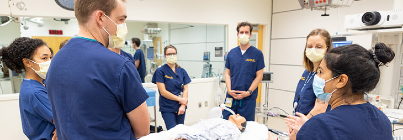Standardized Patient Testimonials
Hear From Our Standardized Patients
Our standardized patients help educate the next generation of health care professionals. See what they have to say about the rewards of participating in the program as patient actors.
“The most rewarding part about being a standardized patient is knowing that you’re helping students gain skills necessary to become better doctors, physician’s assistants, and nurse practitioners. Being able to talk to patients in a respectful way and communicate important information about their health is vital and being a standrdized patient allows us to help them do just that.”
— Jess, Standardized Patient
“Standardized patient work is endlessly challenging, invigorating and rewarding. The team at UC Davis Health is supportive and just plain fun to be around. Becoming a standardized patient over a decade ago has been one of the best professional and personal decisions I’ve ever made.”
— Blair, Standardized Patient
 “The aspect of being a standardized patient that I find most rewarding is the feeling of making the world a better place. Being part of a student’s journey from learning how to use a stethoscope to becoming a family practitioner or surgeon is unparalleled.”
“The aspect of being a standardized patient that I find most rewarding is the feeling of making the world a better place. Being part of a student’s journey from learning how to use a stethoscope to becoming a family practitioner or surgeon is unparalleled.”
— Phil, Standardized Patient
“As an actor, I not only find that the student encounters can challenge my acting skills, with a fair amount of improvisation, but I also find the program very rewarding. Often actors get their rewards through applause, but working as a standardized patient, my reward comes in knowing that I’m helping mold these students into becoming better, more caring doctors.”
— Julie, Standardized Patient
“Getting to put my acting experience to use in such a unique setting has allowed me to further hone my skills as an artist, while providing me with the opportunity to give back to medical education. Being a standardized patient means I am helping future patients to receive the best care they can, by helping student doctors develop their skills through a trauma-informed care lens and within a safe learning environment.”
— Carissa, Standardized Patient


